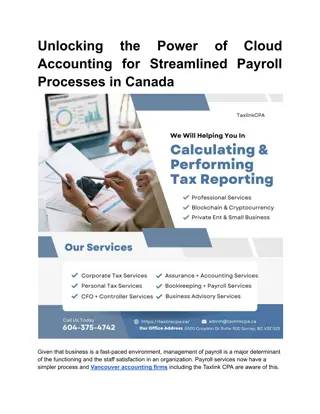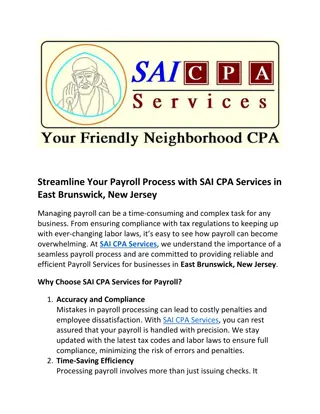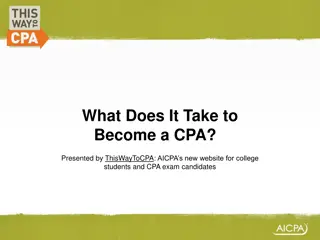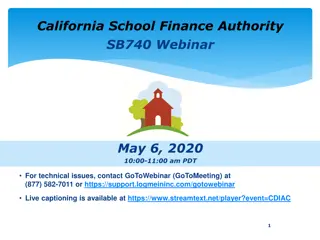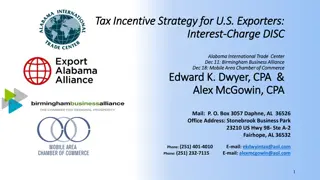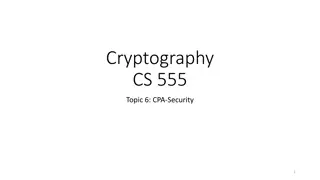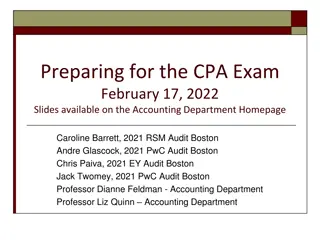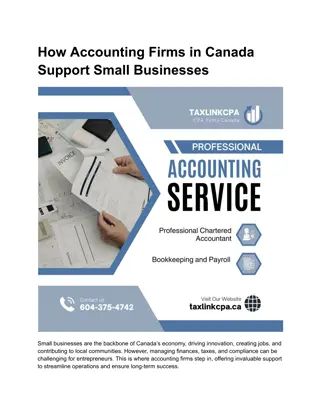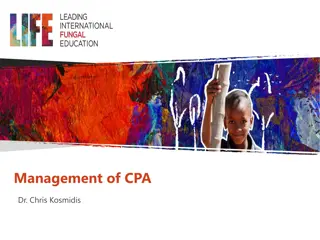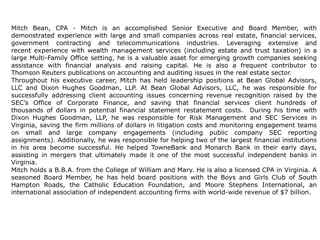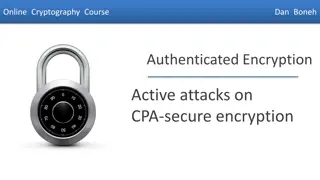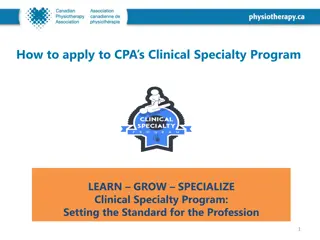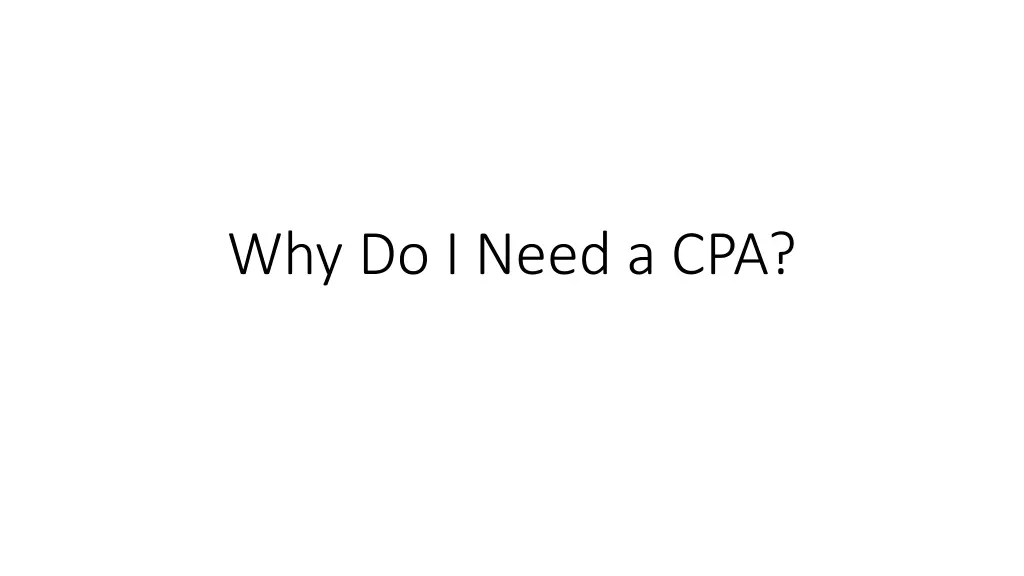
Benefits of Hiring a CPA for Business Financial Management
Unlock the advantages of having a Certified Public Accountant (CPA) on your team for navigating IRS regulations, tax obligations, financial setup, and more in this comprehensive guide. Learn how a CPA can provide invaluable assistance in avoiding penalties, interpreting government regulations, and optimizing your business's financial strategies.
Download Presentation

Please find below an Image/Link to download the presentation.
The content on the website is provided AS IS for your information and personal use only. It may not be sold, licensed, or shared on other websites without obtaining consent from the author. If you encounter any issues during the download, it is possible that the publisher has removed the file from their server.
You are allowed to download the files provided on this website for personal or commercial use, subject to the condition that they are used lawfully. All files are the property of their respective owners.
The content on the website is provided AS IS for your information and personal use only. It may not be sold, licensed, or shared on other websites without obtaining consent from the author.
E N D
Presentation Transcript
How a CPA Can Help: IRS and Other Government Regulations Local, State, and Federal Business Setup Legal and How to be Taxed Application to Pay Taxes What taxes do I pay? Sales Tax, Withholding Tax, 941 Taxes, Unemployment How do I get paid? Salary, Owner Draw, Partnerships Business and Personal Tax Returns
How a CPA Can Help: Avoiding Penalties and Interest The importance of setting up proper records Reporting to your bank Understanding the numbers How to treat the business as an investment not just a job.
IRS and Other Government Regulations: Don t Be Afraid of the IRS Federal Regulations Internal Revenue Service (IRS): Is this a business? Intent should be to make a profit Can take losses against ordinary income Deductions limited with a hobby Must report all income regardless Need to select a business structure Sole Proprietorship (Schedule C) Partnership (1065) C Corporation (1120) S Corporation (1120S) Limited Liability Company (LLC)
IRS and Other Government Regulations: Don t Be Afraid of the IRS Personal liability protection No protection for Sole proprietorship and General Partners LLCs and Corporations are protected Self employment taxes Employer share of social security and medicare Benefits of S-Corp Employer Identification Number (SS4 form) Choosing a tax year Calendar vs. Fiscal Year Tax deadline 15thday of the fourth month.
IRS and Other Government Regulations: Don t Be Afraid of the IRS State Requirements Articles of organization or incorporation Name, contact info, registered agent, etc Annual report any changes in contact info from year to year Foreign entity Sole prop and partnerships do not have to register with state. Local Requirements Sales taxes Privilege license References IRS.gov Publication 15 (Circular E) Employer s Tax Guide MS Secretary of State
Business Setup: Legal Summary Review Chart Sole Proprietorship Partnership Limited Liability Company (LLC) Corporation (C-Corp or S-Corp) Taxation How do I want to be taxed? Self employment taxes Ownership Double Taxation
Application to Pay Taxes What Taxes do I Pay? Federal 941 Taxes (federal withholding, social security, medicare) Federal unemployment taxes (940) Income Taxes State Withholding taxes (TAP) Sales taxes (TAP) State unemployment (MDES) Income taxes
How Do I Get Paid? Owner s Draw Regular intervals or as needed Non-deductible expenses reduce equity Pass through entities LLC, Partnerships, S-Corp Salary (W2) S-Corp reasonable salary C-Corp double taxation How to determine how much to pay yourself? Business Structure Business Performance Business Growth Reasonable Compensation
Business and Personal Tax Returns: Filed with 1040 personal return Sole proprietorship Single Member LLC Separate Business returns S-Corp (1120S) Partnerships (1065) C-Corp (1120) Filing Deadlines Business Personal Estimated Taxes April, June, Sep, Jan
Avoiding Penalties and Interest: Payroll Taxes Deadlines Sales Tax Deadline Estimated Taxes Extensions (Only to file, Not to pay) IRS wants their money
The Importance of Proper Records: Debits and Credits Do I need to know accounting? Choosing the proper software Separate Bank Accounts Reporting all Income Categorizing expenses Using credit cards
Reporting to Your Bank: Banks need to review financials Business loans Asset purchases Interim financials (monthly, quarterly) Year End financials Cash vs. Accrual Tax Basis Other accounting framework (GAAP) May need a Compilation, Review, or an Audit. Must be performed by CPA
Understanding the Numbers: What Does All This Mean? Cash and Bank Reconciliations Cash Flow and Budgeting Balance Sheet Assets and Liabilities Income Statement Profits Understanding Margins Equity Budget Comparisons
My Sales Sales Systems A digital platform that holds key metrics, customer information and other relevant material to help you track and meet sales goals. Difference between Marketing and Sales Marketing expenses to attract customers Sales converting those potential customers/leads to payments for your products or services. Distribution Channel Path produce/service takes to get to the market. Direct or Indirect
Direct vs Indirect Direct vs. indirect distribution channels
My Sales What is the right price for my product or service? Depends on cost variable vs fixed costs Competition Demand what does the market allow? What sales do I need to make a profit? Need to understand cost breakeven analysis Could be based on volume How do I estimate my sales? Forecasts and projections Market analysis - competition Know your sales price, quantities, costs
Estimating My Expenses Why is profit important? Growth, Market fluctuations, Prepare for the unknown Secure financing from bank Attract investors Direct Cost vs Indirect Costs Direct COGS (labor, materials, supplies) Indirect Rent, utilities, general office expenses How long will it be before I make a profit? Startup cost Marketing customer base Sales Volume
Estimating My Expenses What is cash flow? A measure of how much cash a business brought in or spent in total over a period of time cash in vs. cash out. Operating activities daily operations Investing activities investments in other companies, stocks, etc.. Financing activities raising money by selling bonds, paying money through dividends or stock buybacks. How do I plan for cash flow needs? Understand your costs budget of expenses Sales forecasting Prepare for the unexpected
A Business Should be an Investment: Forecasting and Strategy Set Goals Understanding Trends What do the customers want? Learn to adapt Planning for the unexpected Pandemic for an example Importance of an Emergency Fund Don t burn through all your equity Have a plan and always be prepared Partner with a CPA and utilize their knowledge
Thank You Clint Brown, CPA Brown CPA PLLC 7708 Old Canton Rd, Suite A Madison, MS 39110 Office: 601-879-4411 Cell: 601-325-6013 clint.brown@brownafs.com




